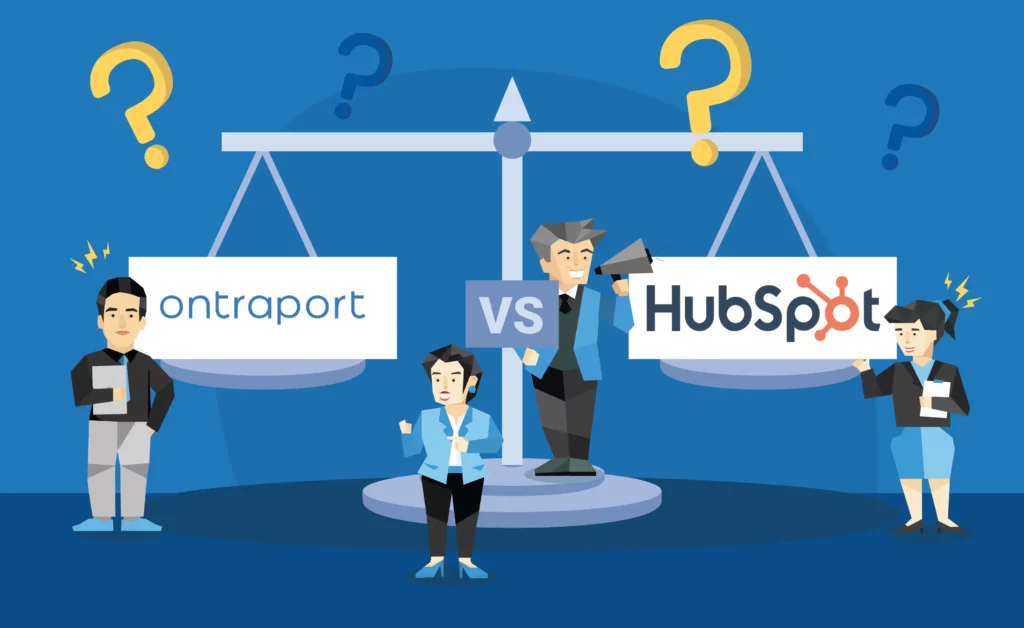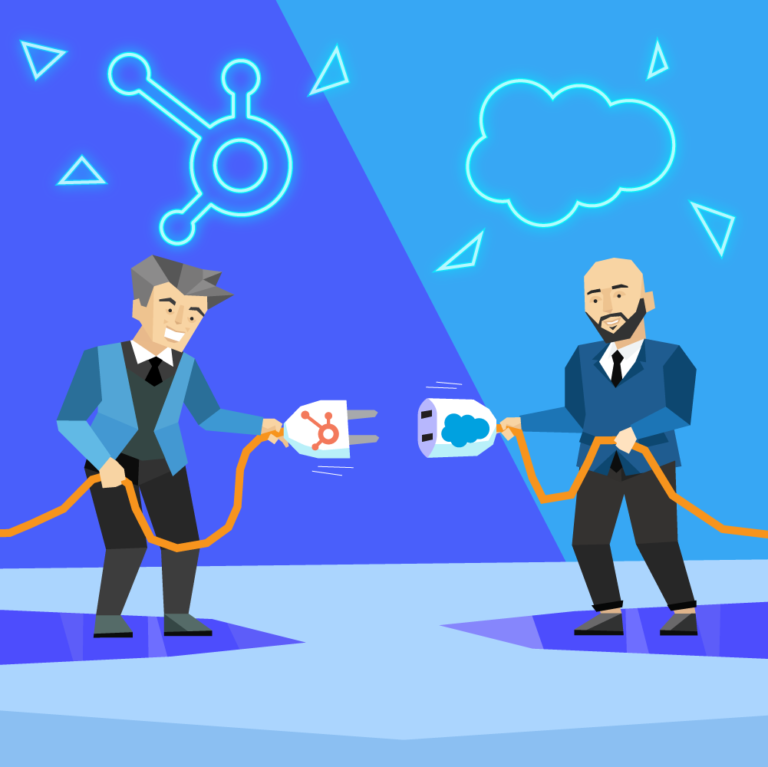If you find yourself asking whether Salesforce or HubSpot would be the better option for your business, then you are in for a spot of luck. Before I dive in too far, let me immediately say that my personal preference is always more along the lines of “both.” So much so that I’ll dedicate an entire section to it a little later on.
The TLDR, however, is that comparing HubSpot to Salesforce is not really an apples-to-apples comparison, as both are absolute behemoths of companies that offer platforms and complex offerings and products as part of their core platform. Whilst simultaneously working natively together (provided you have HubSpot pro, but there ain’t much point for any functioning business to not have pro-HubSpot… alas a post for another time).
Here are some initial takeaways:
- The platforms work natively with each other and the integration is extremely powerful.
- Both are total juggernauts in their own right with complex product offerings.
- Salesforce CRM will never be a true replacement for all that HubSpot can do; you would need to also compare one of their extra products such as Pardot against HubSpot simultaneously.
- HubSpot lately is seriously trying to cut Salesforce’s lunch.
- No review article will ever give sound advice from someone who straddles both platforms. ( Call me 😉 )
My Personal Background with Both Salesforce and HubSpot
My first job in marketing was in the world of CRM, ironically not using either of these two platforms. My life was learning what was aptly referred to as confusion soft back in the day. As my growth curve stiffened and I started to know my way around a CRM a little better, I knew there must be a better tool out there.
My First Foray into HubSpot
You can’t work in digital marketing without eventually running into HubSpot. You could even argue that in many respects they are the reason so many digital marketers even know what a CRM is in the first place. Their content is everywhere, and they absolutely practice what they preach.
When I was still working in-house, I spent my last legs trying to convince my boss that we should take the plunge and shift to HubSpot. He declined, and later spent mid-six figures building his own CRM from the ground up.
I was hooked, and when I set up my own agency in 2015, I decided that the best way I could kick start this would be by joining the HubSpot partner program. Suffice it to say, I’ve been a HubSpot user for almost a decade, but not exactly a monogamous HubSpot devotee. Here at Paradox Marketing, we work consistently across three primary CRMs of choice, and begrudgingly in about five other options. HubSpot and Salesforce are always our picks for our mid-market, well-established, enterprise, or venture capital (VC) backed clients.
Bleeding orange would be the term my business partner Aaron uses when you encounter someone who is all about HubSpot and nothing more. The fact that this is a phrase, let alone a phenomenon, should give you some insight into just how great HubSpot can be. I don’t see many people with this level of commitment to any other software out there, other than Salesforce; only the Salesforce devotees often come across a little more like they are in a marriage of convenience and that a divorce may just bring down their own empire.
My Progression to Salesforce
Around 2020 my then client, now business partner, Aaron, started pushing me harder to provide services into Salesforce. It began simply, with us having our development team building custom integrations from various marketing technologies into his clients’ Salesforce accounts. Ironically, apex code and custom APIs are normally the parts of Salesforce that even the certified Avengers and trailhead aficionados typically don’t touch, but we are nothing less than a walking Paradox at times.
When we merged with SMB Advisors in 2021, I finally had a Salesforce account to play around with without the fear of breaking something for a client. I’d like to say that I took this as a golden opportunity to sink my teeth in and master the platform. That would however make me a good-for-nothing liar.
Let’s be real: Salesforce is an absolute beast of a platform. There is a reason that 80-90% of Fortune 500 companies are using this software. Nothing scales, customizes, and adjusts to your business in quite the same way, short of pulling together a group of developers and dropping vast sums of money to customize something from the ground up.
Four years in now, I don’t think I could ever see or envision building highly complex data architectures, business automation, or enterprise systems without it. That is not to say that it is the right option for every business. We take pride in being platform agnostic and matching the platform to the business and never the business to the platform.
Comparing HubSpot to Salesforce Is Not So Straightforward
In many ways, the two were never supposed to be viewed as competition or potential alternatives to each other. So much of HubSpot in the beginning was marketing-focused, and the tools were built from almost inception to be integrated natively (more on that later).
In fact, before HubSpot started to try and cut Salesforce’s lunch, they themselves also used Salesforce to power their sales team. If that doesn’t say something then I’m not sure what else would.
Perhaps the best lens to view this through is explained in a post last updated in 2023, in which HubSpot announces that they are indeed “keeping it going” with their partnership with Salesforce. The express terminology is that the two products “overlap” in features: AKA not a one-to-one comparison by any stretch.
The reality is that they are huge publicly traded companies that have massive offerings, some of which overlap with each other. They are, however, irrevocably connected to one another and share clients left, right, and center.
Best of Both Worlds Means Get Them Both
In my perfect build scenario, I would always deploy both. Their integration is native and supported out of the box. No Zapier, no custom development etc; they will just simply plug into each other.
We have written about our ability to help you set up their integration here, and some general advice for setting it up here. As you can see, we love the integration that these two tech titans have with each other.
The reality is that HubSpot is the absolute king in all marketing automation and reporting etc, whilst Salesforce reigns supreme in handling complex business architectures. If you can swing it, then you should buy both. If you must choose and buy only one, then it’s likely more complicated and something that you are best speaking to an expert about.
Understanding HubSpot as a Platform
Understanding HubSpot is like discovering a goldmine of user-friendly features and all-in-one marketing tools designed to streamline your business processes. It’s built for those who value efficiency and ease of use, with a platform that guides you through its functionalities with an almost intuitive touch.
HubSpot is the go-to for businesses looking to enhance their digital marketing without getting bogged down in complexity. Its seamless integrations, comprehensive training resources, and top-notch support make it more than just software—it’s a growth partner for businesses aiming to connect with their audiences and scale effectively. In short, HubSpot offers a smooth ride for anyone looking to boost their marketing game without the steep learning curve.
Key Features
HubSpot is heavier on features for digital marketing, which is an area that Salesforce core (the sales product) has almost no coverage. You can of course buy Salesforce Sales Cloud and then also buy Marketing Cloud to start getting feature parity with HubSpot across marketing, but at that point, you’ve already bought two systems and you may as well have just bought Salesforce and HubSpot.
HubSpot also has its own version of Sales software, which evolves too rapidly for me to create a soon-to-be-outdated list within this post. Just understand that your main comparison is really going to be:
HubSpot Marketing vs Salesforce Marketing Cloud or Pardot
HubSpot Sales Hub vs Salesforce Sales Cloud, or
HubSpot Service Hub vs Salesforce Service Cloud
You’ll find plenty of other pages out there that do their darndest to give you feature comparison charts, and the sales team from HubSpot or Salesforce will be more than glad to give you some decks that discuss their feature sets in comparison to the other.
I’ll leave you with some words of advice that you:
a) should not let specific individual features sway you, as the features are very rarely what matters the most
b) should also be measuring features of your current system vs the new one, to make sure things you are using will not be lost, or at least understand the implications.
Things I Love and Dislike About HubSpot
Love |
Dislike |
|---|---|
|
|
Understanding Salesforce
Understanding Salesforce is about getting to grips with a platform that packs a punch in customization and integration, making it ideal for businesses ready to scale up big time. It’s all about giving you the tools to tweak and tailor everything to fit your operations like a glove, with the kind of power and flexibility that large enterprises or ambitious startups need.
Yes, there’s a bit of a learning curve, but the effort pays off with a system that can grow and evolve with your business. Salesforce aint just another piece of software; it’s a heavy-hitter that can significantly boost your business efficiency and growth, provided you’re willing to dive in and make the most of what it offers.
Key Features
I’m hoping you’ve picked up on my tone and pace thus far and are not expecting me to regurgitate a features list here. You can see for yourself from the horse’s mouth – Salesforce has pretty much identical features to HubSpot, each with its own nuance.
Once again, it’s most important that you weigh up the features of your current system (and whether you’re even using them) and ensure that the features of Salesforce will align or improve upon them.
All the most obvious ones such as lead management, customer relationship, data storage, etc. are sound and barely need mentioning.
Things I Love and Dislike About Salesforce
Love |
Dislike |
|---|---|
|
|
Pricing and Plans for HubSpot and Salesforce
You can view the pricing for HubSpot here, and Salesforce here. I should give some words of caution here though:
- Both of these are enterprise platforms (AKA not cheap).
- Both of these have complex purchasing decisions that need careful selection.
- Both of these are negotiable, and their sales teams would love to “make a deal” and negotiate custom pricing.
Whilst HubSpot tends to charge you based on how many contacts you have whilst giving you the users (except when it comes to some of their products) for free, Salesforce is more inclined to charge you based on the users you have in your organization.
Both of these have their upsides and downsides. Neither can be viewed through a particularly one-size-fits-all lens, and I would urge you to actually get a third-party consultant to help you price up your specific needs and compare the two (even if it’s not us).
Just know that with either solution you are looking at a minimum of $1000 or so per month to get a functioning system (assuming a bunch, such as a minimum of seven staff members, or at least 20,000 contacts, and so on). Both tools have much lower options, but if you are using either to their fullest then you’ll be running into the four figures per month pretty quickly, and for bigger businesses beyond.
I have a pet hate for generic software review pages that tell you that HubSpot starts free, and Salesforce starts from $25, as this is putting what is realistically enterprise software in front of people with a bit of a false premise.
By the way, when compared to some other lower-priced options, our preferred small business all-in-one is actually always going to be Ontraport for people who want/need power but are more price-conscious.
Make no mistake, HubSpot and Salesforce are both platforms for people with the budget and proven business models (or some fat VC money – both work) who are primarily interested in the BEST more so than the most affordable.
How Our Experts Can Help You Customize Your Marketing Automation
We are platform agnostic, so you can trust us to not be swayed one way or another or to just say that your best option is the one that we happen to feel most comfortable with. We pride ourselves on being “your marketing department,” and that means talking straight, getting to the point, and understanding all the intricacies of your business as well or better than your existing staff members.
The three main ways that we can help you as you weigh up the relative benefits of Salesforce vs Hubspot are
CRM Selection Project
It may seem over the top, but we would wholeheartedly recommend that you treat the selection of your CRM (especially if you already have a CRM) as a project in its own right. The benefits of this are that you will end up with
- the due diligence needed to ask the right questions
- a seasoned veteran who is paid for their actual consultation and experience
- advice that transcends the type of consultation you will get from a salesperson whose vested interest is always to highlight why their product should be your selection.
We will jump in, deep dive inside your existing CRM (if you have one), audit your existing workflows, your existing team, and your existing tech stack, and we’ll make a tailored recommendation based on the budget you have and the needs you have.
Custom CRM Integration Solutions
We have a team of API developers ready and waiting to connect anything you need to either of these platforms – well beyond the scope of what you’ll pull off yourself using Zapier (although both Salesforce and HubSpot connect perfectly to Zapier).
Ongoing Support and Optimization
No software is ever done right out of the box, and no implementation ever truly comes to an end. That is why we offer ongoing support for all manner of CRM platforms. For those who want to permanently have the experts in their corner, we are consistently here for you.
You're in Safe Hands with Either, Better Hands with Both, and the Best Hands with Us
As we’ve journeyed through the intricate worlds of HubSpot and Salesforce, it’s clear that choosing between these titans isn’t about finding a one-size-fits-all solution but rather identifying which platform—or a combination thereof—aligns best with your unique business needs, goals, and processes. Whether you’re drawn to HubSpot for its user-friendly interface and robust marketing tools, or Salesforce for its unparalleled customization and scalability, the choice reflects your strategic priorities and vision for growth.
But why limit your potential by choosing one when you can harness the strengths of both? Our exploration underscores that leveraging HubSpot and Salesforce together can create a powerhouse ecosystem that drives marketing efficiency, sales effectiveness, and customer satisfaction to new heights.
Navigating these decisions, however, can be daunting without the right expertise. This is where we step in. At Paradox Marketing, we’re not just observers of the HubSpot and Salesforce synergy; we’re practitioners and strategists who live and breathe these platforms. Our experience across industries and business sizes equips us with the insights to tailor a CRM solution that not only fits your current landscape but also propels you toward future success.
Ready to elevate your CRM strategy but unsure where to start? Let’s talk.
Whether you’re considering HubSpot, Salesforce, or both, our team is on standby to guide you through the selection, integration, and optimization processes. From conducting a comprehensive CRM audit to providing ongoing support and optimization, we ensure that your marketing automation is not just a tool but a transformational force for your business.
Don’t settle for generic advice. Opt for a consultation that’s as unique as your business. Reach out to us at Paradox Marketing, and let’s craft a CRM strategy that not only meets your needs but exceeds your expectations.








